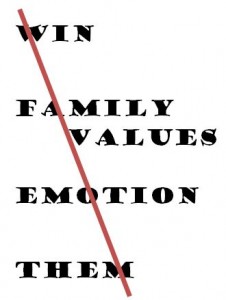Our’s is a language of binaries. English makes “clear thinking” obvious, easy, and often the stuff of complete fantasy.
It’s an obvious feature of our national politics that we tend to place two very different individuals in two mutually separate camps. We know the problem. Characterizations of and by the President, members of Congress, and even news sources tend to be framed in “we” versus “they” terms. Only in moments when we can think more clearly, do we understand that our boxes of categorization are not very helpful.
Part of the energy for this categorical thinking comes from what I’ve described elsewhere as the dark instinct to scapegoat our problems to “them,” thereby transferring any guilt or responsibility to others. It’s an ancient impulse: one of the unpleasant effects of self-identifying with ideological and religious communities. Scapegoating helps us define where rigidly observed property lines are, and who lives “out there” beyond them. We need not spend time with those on the other side. Indeed, it is easier to maintain the purity of a rhetorical scapegoat if it isn’t fouled up by the complexities of real experience. We like our villains pure. Thus our epidemic of drug abuse and crime are caused by “them;” Americans can insert their favorite ethnic, racial or corporate villains. Similarly, underemployment and low paying jobs can be scapegoated to a fantasy of Mexicans flooding across the border, the Chinese stealing our technological secrets, or those wily Canadians using tariffs against our home-grown products. Take your pick. Dualistic thinking usually springs from a degree of intellectual laziness, and from the intellectual monoculture that is English grammar. It’s easier than the more open-ending thinking motivated by genuine curiosity. It is also sustained by the ease of finding partners with the same thoughts. Complexity drains away in favor the comforts of a world made simple.
A language of binaries turns short-form media like Twitter into perfect carriers of distinctions pitting the desirable against the despicable. The easy comfort that results is only undermined if we open ourselves up to more information, or the work of reporters who have bothered to test conclusions against the available evidence. But all of this can be unsettling to those of us who have grown comfortable with mental furniture we are not about to move.
Some languages carry a greater appreciation for bridging apparent dichotomies and transcending narrow categories.
If we look for useful ways to shake up cognitive habits that have grown stale, it can be useful to be reminded of more open-ended intellectual traditions, such as Confucianism or Taoism. It may be enough to know that these belief systems carry a greater appreciation for bridging apparent dichotomies and transcending narrow categories. In addition, the structure of various Chinese dialects encourage a degree of ambiguity, making the urge to express two mutually exclusive choices–“is” or “is not” statements, “yes” or “no” dichotomies–more awkward to render. As a colleague who grew up near Shanghai noted, “‘To be or not to be'” is probably not a phrase that comes easily to the Chinese. Broadly speaking, language can helps the Chinese mind entertain more nuanced possibilities. Views put on offer are expressed as more contingent: better understood as joined rather than isolated. All things considered, this probably makes English a language that is a better for debate than for reconciliation.
![]()

